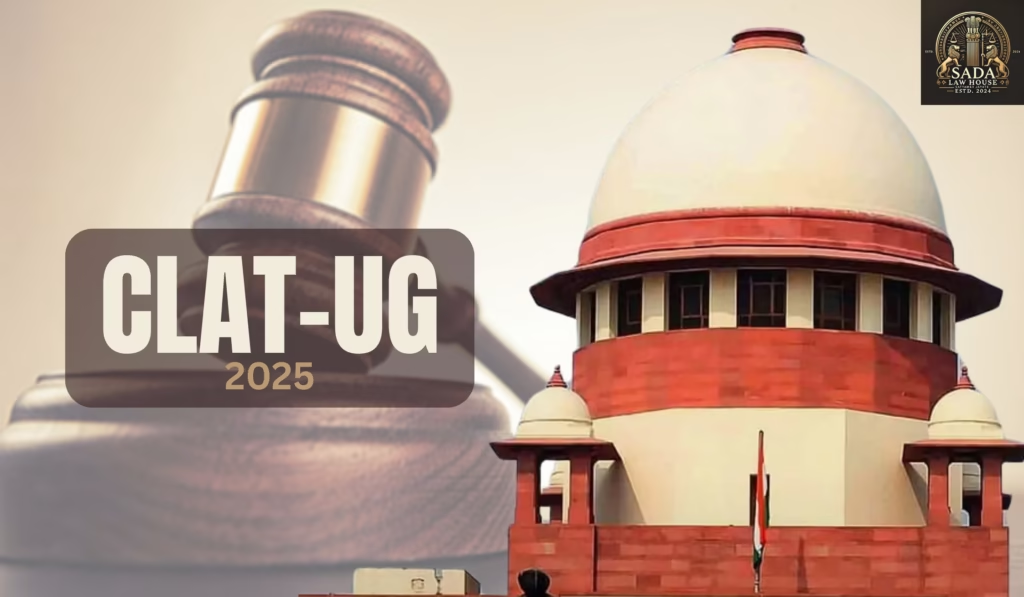Supreme Court Orders CLAT-UG 2025 Merit List Revision: Key Questions Removed and Re-Evaluated
Trending Today Supreme Court Orders CLAT-UG 2025 Merit List Revision: Key Questions Removed and Re-Evaluated Supreme Court Urges BCI to Mandate AIBE Status in Vakalatnamas for Lawyers Enrolled After 2010 Supreme Court Orders National Safety Protocol After Doctor’s Rape and Murder at R.G. Kar Medical College Supreme Court Upholds Child’s Right to Privacy, Restricts DNA Tests in Divorce Cases Alleging Adultery Supreme Court Grants Bail to Manish Sisodia in Delhi Liquor Policy Scam Citing Article 21 Rightsv Uttarakhand High Court Flags Misuse of ST Certificates Based on Residency in Tribal Areas Jharkhand Government Launches Health Insurance Scheme for Advocates and Families Delhi High Court Directs NLU Consortium to Ensure CLAT Access Is Not Denied Due to Language Barriers India to Conduct Largest Civil Defense Drill Since 1971 Amid Rising Tensions with Pakistan Supreme Court Mandates Cashless Treatment for Road Accident Victims in Landmark 2025 Ruling: S. Rajaseekaran v. Union of India Supreme Court Orders CLAT-UG 2025 Merit List Revision: Key Questions Removed and Re-Evaluated MAHI SINHA 07 May 2025 The Supreme Court has directed a revision of the CLAT-UG 2025 merit list after identifying critical errors in several exam questions. Learn how this impacts students and what changes have been ordered. Supreme Court Flags CLAT-UG 2025 Errors, Directs Merit List Correction The Supreme Court of India has intervened in the CLAT-UG 2025 controversy, identifying serious issues in several exam questions. A bench comprising Justice B.R. Gavai and Justice A.G. Masih ruled that the Consortium of National Law Universities must revise the merit list after evaluating and removing specific questions. Court Criticizes Consortium for Careless Paper Setting The Court expressed deep dissatisfaction with the manner in which the Consortium crafted the CLAT-UG paper. Referencing its 2018 verdict in WP(C) 551/2018, the Court reminded the Union Government of India and the Bar Council of India of their failure to establish a permanent CLAT-conducting authority. A response is expected by next Friday. Questions Re-Evaluated or Removed by Supreme Court Question 56: Environmental ResponsibilityThe answer key incorrectly stated that only the state is responsible for environmental protection. The Court ruled that option (c), which includes citizen responsibility, should be the correct answer. Positive marks were to be awarded for (c) and (d), and negative for (a) and (b). Question 77: Legal Reasoning and Contract LawAlthough the Delhi High Court had ordered the removal of this question, the Supreme Court reinstated it. The bench ruled that a student using basic logic could answer it without legal knowledge. Only option (b) was deemed reasonable. Question 78: Bribery and Government EmploymentThe Court agreed with the High Court’s judgment affirming option (c) as correct. This question remains valid. Questions 85 and 88: Similar and RemovedAfter acknowledging flaws in question 85, the Consortium had already removed it. The Court also ordered the removal of question 88 due to similar reasoning. Questions 115 and 116: Unreasonable Mathematical ComplexityThese questions required complex calculations inappropriate for an objective law entrance test. Both were ordered removed to maintain fairness. Petitions by Siddhi Sandeep Ladda and Aditya Singh Both Siddhi Sandeep Ladda and Aditya Singh challenged the validity of the merit list. Ladda, who achieved an All India Rank 22, argued she was denied admission to NLSIU due to the High Court’s unfair decision affecting only certain paper sets. Supreme Court Questions Consortium’s Accountability Justice Gavai raised serious concerns over the competence of question paper setters, citing inconsistent and confusing questions. The Court criticized the complexity faced by 16–17-year-old students, questioning the expectation that they solve problems needing a calculator. Background of the Case The issue began on December 1, 2024, when questionable answers were challenged before the Delhi High Court. The High Court had initially directed the Consortium to revise scores for candidates from sets B, C, and D, but excluded set A candidates. A Special Leave Petition was filed by Ladda, arguing discrimination against A-set candidates. The Supreme Court consolidated similar cases and ordered a review. Conclusion: What This Means for CLAT Aspirants This Supreme Court verdict reaffirms the judiciary’s role in ensuring fairness in competitive exams like CLAT. By mandating the revision of the merit list and questioning the efficacy of the Consortium, the Court has opened the door for more transparent and accountable examination processes. Aspirants and stakeholders must now push for structural reforms, including the establishment of a permanent CLAT-conducting body. As the case continues to unfold, the verdict stands as a crucial reminder of the importance of accuracy and integrity in academic assessments. Leave a Reply Cancel Reply Logged in as Sada Law. Edit your profile. Log out? Required fields are marked * Message* Live Cases Supreme Court Orders CLAT-UG 2025 Merit List Revision: Key Questions Removed and Re-Evaluated Supreme Court Orders CLAT-UG 2025 Merit List Revision: Key Questions Removed and Re-Evaluated Sada Law • May 7, 2025 • Live cases • No Comments Supreme Court Urges BCI to Mandate AIBE Status in Vakalatnamas for Lawyers Enrolled After 2010 Supreme Court Urges BCI to Mandate AIBE Status in Vakalatnamas for Lawyers Enrolled After 2010 Sada Law • May 7, 2025 • Live cases • No Comments Uttarakhand High Court Flags Misuse of ST Certificates Based on Residency in Tribal Areas Uttarakhand High Court Flags Misuse of ST Certificates Based on Residency in Tribal Areas Sada Law • May 7, 2025 • Live cases • No Comments 1 2 3 … 5 Next »


